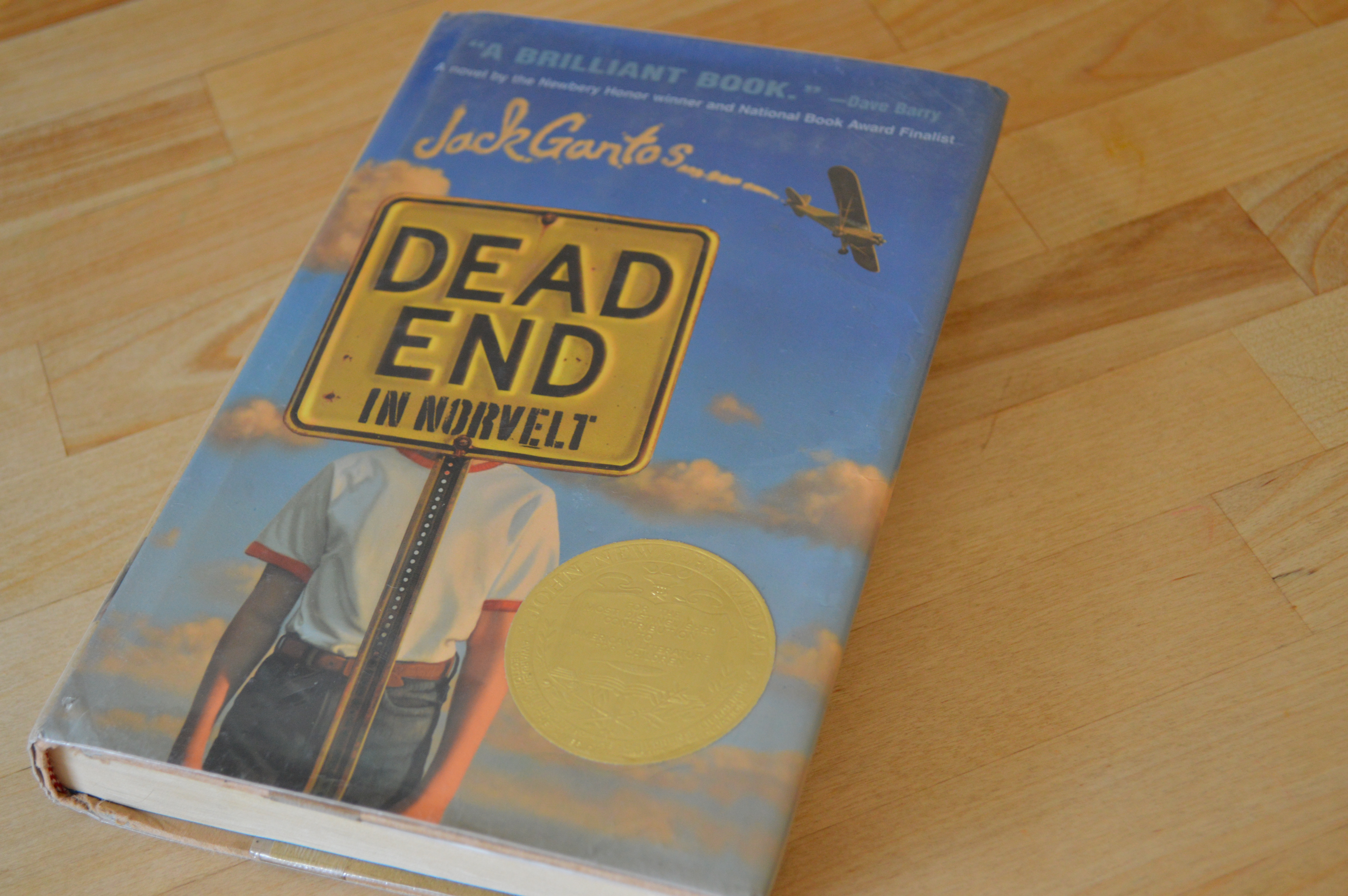
The 2012 Newbery winner is Dead End in Norvelt by Jack Gantos. In a funny, fictional autobiography, Jack Gantos’s mid 1960s summer is ruined when he accidently shoots off his father’s Japanese sniper rifle. His only reprieve from two months of being grounded is to help his elderly neighbor Ms. Volkner write obituaries for the town paper. Set in the real planned community of Norvelt, Pennsylvania, the brain-child of Eleanor Roosevelt for whom the town is named, this summer romp through the past as each original Norvelt resident dies and gets written up in the paper is funny and original.

What I liked. The obituaries and Miss Volkner and her small histories of individuals of the town were some of my favorite parts. I also liked the way the young boy’s obsession with war was tempered with the reality of guns, killing, and war from conversations with his dad, his own reflections on conquistadors, and Ms. Volkner’s writings. I also thought Ms. Volkner helping to stop his nosebleeds was one of my favorite parts of the book.

What was interesting The setting Norvelt, PA was itself was so fascinating. I liked how this book really brings so much attention to this little, quirky social-project community where people could have their own house and land to have a big garden on. I thought setting the book in the 1960s, which is a long time ago for us, but was a good ways after the town was incorporated and was beginning to fade was a good choice in letting the reader experience the history of the town.

What were some limitations. To me, this book is a real glimpse into junior-high boy land, and it seems like that is probably the main audience as well. Some things were pretty macabre and gross, literally a lot of nosebleeds, buckets of blood at the undertakers, and plenty of dead bodies. There is a whole story about how Jack farted to save a deer’s life, so it feels pretty junior-high boy. And in the end, there ends up being a murder and murder mystery which again are never my favorite parts of books (although this one wasn’t too bad), but that’s really just a personal preference. Overall, I don’t think any of these things are really more than ways in which this book is just for older audiences, definitely junior high and up. One thing I would like to have seen would have been a bit of a breakdown in an author’s note at the end of what was real and fictional.

Similarity to other Newbery winners. In many ways the humor and tone of this book make it different from other Newberies. It seems somehow older and wryer. (I mean Dave Barry endorses it, so that’s kind of all you need to know). And it’s fictional autobiographical, which as far as I can remember is the first time we’ve had that genre win the Newbery. Some of the male protagonists in Criss Cross and The Westing Game do have some similar escapades. Holes, Bud, Not Buddy, The Whipping Boy, From the Mixed-Up Files of Mrs. Basil E. Frankweiler, and It’s Like This, Cat, do all have a male protagonist coming of age, humor, and a big mystery to solve as well, but again, the tone and style of humor is pretty different. A Year Down Yonder has humor and a number of older, funnier townspeople, but has a female protagonist and is more episodic chapter to chapter than Dead End in Norvelt. Overall it reminds more of the TV show The Wonder Years, the film The Sandlot, or Gary D. Schmidt’s wonderful books like the 2009 Newbery honor The Wednesday Wars or its sequel 2013 Okay for Now which are also set roughly in the 1960s.

What it teaches me as a writer. One thing that I think Jack Gantos did really well was keep his characters both funny and rounded enough so that you weren’t sure as the story progressed who might have been behind the murders, but even more than that who was Jack’s friend. I think capturing that feeling of a middle schooler of being confused about who is on his or her side and who is not. I think that is hard to pull off as a writer, but it really is part of the experience of being a middle schooler. This book is pretty packed with action and history and people’s highs and lows, it feels sort of full to bursting with life.
Have you read Dead End in Norvelt? What are your favorite autobiographical novels?
*Note* This post contains Amazon affiliate links, which means if you were to buy a book, I’d get a tiny commission at no cost to you. Thanks for supporting Stories & Thyme!*